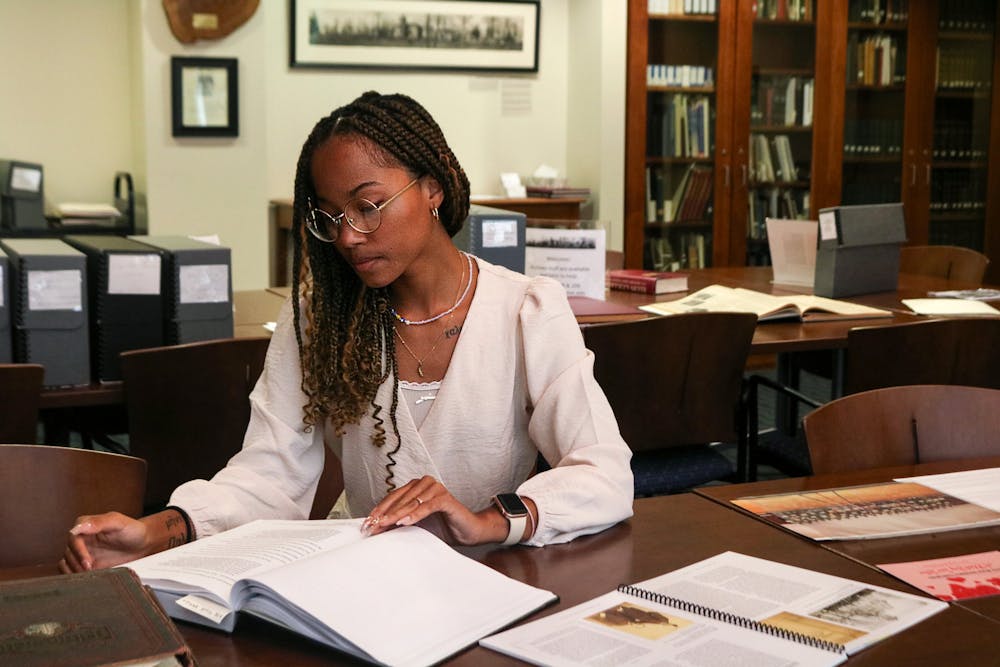From the moment Elon University senior Jasper Myers first opened L’Tanya Richmond’s master’s thesis earlier this summer, she said she knew she had found something remarkable. The thesis, titled “Elon’s Black History: A Story To Be Told,” was published in 2005 while Richmond was pursuing her master’s degree at Duke.
“It's the first consolidated Black history project on Elon’s campus,” Myers said. “After I read it and made an outline, I was like, ‘I just feel like we should be doing something with this information.’”
It was through Myers’ work at Elon’s Archives and Special Collections that she was first introduced to Richmond’s work. With the support of her advisers Shaunta Alvarez and Libby Coyner, Myers dove deeper into Black history at Elon over the past summer.
Before Richmond wrote her master’s thesis, she received her undergraduate degree from Elon University in 1987. She then worked in Elon’s admissions office for a period of several years as an admissions counselor then associate director of admissions.
After working in the admissions office, Richmond became the director of Elon’s multicultural center, which would later become the Center for Race, Ethnicity & Diversity Education. According to Alvarez, Richmond’s research and advocacy led to the creation of the Wall of Fame in Moseley, which celebrates the achievements of Elon’s Black students.
“She did a lot of work revamping and revitalizing how they recruited students of color,” Myers said. “She also made sure that these students felt supported and successful, had access to mentorship and resources, and were given the chance to flourish and not just survive.”
Myers’ research has since incorporated other significant documents and projects that examine public history as it relates to Elon’s Black population, such as the 2020 History and Memory Report and the Black Lumen Project.
Myers said she was grateful for her advisers at Elon’s archives for their support of her research.
“I'm very grateful that I get to research and learn and curate and create in an environment that is very community-driven,” Myers said. “They've always done their utmost to make it clear that if a student has a passion or a student has a want to do something, if there's the resources and the materials for it, then why can't they do it?”
As Myers moves forward with her research, she said she hopes to consolidate her findings, raise awareness of Black history at Elon and lay the groundwork for future students who may want to continue her research.
“I think that a lot of the work that I'm doing right now is with the intention of creating a precedent and setting a tradition for future generations of student assistants in the archives,” Myers said.
One of hermain goals is reworking the guided historical tours the archives offer.
According to Myers, these tours focus on local history as it relates to Elon’s campus and are often given to special guests, Elon 1010 classes, or Elon’s faculty and staff members. Myers said plans to revise these tours to highlight Black history specifically.
“There's so much history everywhere on this campus, especially as it relates to the Black population,” Myers said. “It’s impossible to create a tour that's under an hour and covers all of it, so I am thinking about alternative routes based on the specific angle of Black history we want to highlight or forefront.”
Another potential product of this research is a written medium called zines, which Myers said are small, often pocket-sized, publications that have long been used as political devices aimed at enacting social change.
Myers's idea to create zines was in part inspired by one of her advisers at the archives, Libby Coyner. Coyner works at Belk Library as an archivist and assistant librarian and said much of her work includes teaching students about the history and impact of zines.
“Zines are a super accessible form of storytelling, and social activism is the tradition they come from. They've been a tool for feminist and punk and activist and other underground communities to reclaim the means of production and tell their own stories,” Coyner said. “Zines are imperfect, zines are vulnerable, zines swear, zines are filled with images, and text, and cut, and paste. They kind of break a lot of the rules.”
Myers said she hopes to create two zines with the research she has compiled, one of which will focus on Black history at Elon, while the other will center on Richmond specifically.
Myers said the zines could be available across campus.
“It could live in like the CREDE and also the archives,” she said. “People could take a little bit of history in their pocket with them wherever they go.”.
Myers and her advisers at Elon’s archives said they hope this work will help raise questions about Elon’s history while also reiterating the importance of archival work and local history in general.
“I think that we can absolutely learn from studying local history,” Myers said. “In fact, I think the only way to move forward within you know, a small, local, microcosm like Elon is to pay attention to the past and learn from the past and listen to the past.”
A copy of Richmond’s thesis is available for viewing at the university archives in Belk Library.


